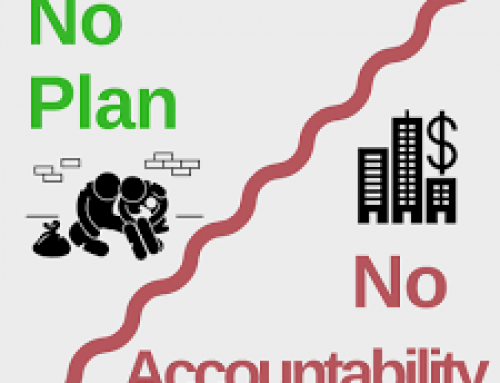October 26, 2015
By: Bobby Casey, Managing Director GWP
 Through most of school, many of us were taught American history portrayed through a slightly over-romanticized lens. Born out of the bloody battle fields of the New World, was the Great Experiment: a noble new country won on the backs of the common man under the honorable leadership of General George Washington. They defeated the horrible English tyrant, King George III, and his oppressive tax regime.
Through most of school, many of us were taught American history portrayed through a slightly over-romanticized lens. Born out of the bloody battle fields of the New World, was the Great Experiment: a noble new country won on the backs of the common man under the honorable leadership of General George Washington. They defeated the horrible English tyrant, King George III, and his oppressive tax regime.
Sound familiar? To this day you’ll still hear many conservatives regurgitate this fantastic saga. The tale is great, don’t get me wrong, but it’s not the clear cut, black-and-white, good-versus-evil-and-good-prevails story American history school books and nationalistic pundits make it out to be.
A few things were whitewashed in the making of that account, mainly to protect the guilty.
This is not to say that King George III was just a misunderstood sweetheart. He wasn’t. It’s more to say that the new George wasn’t all that different than the old George. Much of the foundation for America was built upon what was already known and done in England, with a few tweaks. We called our Parliament, Congress. We got to choose our king every four years. Many British laws were grandfathered in as common law. And soon after the American Revolution was won, the new George imposed his own taxes on the weary nation.
To hear some tell it, the start of America might as well have been a new era by which to construct our calendars. We all know B.C. and A.D. but there is also B.R. (Before Revolution) and P.V. (Post Victory). There’s hardly any discussion about America’s British roots. There’s considerable discussion when it comes to such tyrants as Hitler, Mao, Stalin, and Mussolini; however, children in the States don’t hear much in the way of British history.
I found that odd. It’s as much a part of the American history continuum as the Revolutionary War itself. Sure we hear about the Separatists, and the Divine Right of Kings. All the physically gory stuff. Yet, we are spared the economic lessons of feudalism and monarchies. I have to wonder if that’s because they resemble what we have now in the United States.
For example, how is what we have now not just contemporary fiefdom? If you have land in the United States, you still owe some sort of tribute to the Lord of the Manor, right? We call them property taxes. You can see it more clearly in the relationship between the military and the government. In exchange for base housing, VA loans, and the various life benefits, there is this agreement to fight on behalf of the Lord of the Manor (i.e. the government).
Then there is this term I’d never heard before called “moneyage”. My spellcheck doesn’t even recognize it, but it’s a real term. A real and old term dating back to when S’s looked like F’s. Here is its definition, according to the American Journal of Numismatics:
“This term means not only the right to coin money, but was also formerly applied to a tax paid to some of the Norman rulers of England, in consideration of their refraining from debasing the coinage.”
“[Carte, History of England, 1747 (i.482) Moneyage was a duty of twelve pence paid every third year in Normandie to the Duke for not altering the coin.”
If it involved animal sacrifice rather than a monetary one, you would think it was some sort of pagan ritual. Rather than offering an animal for a gentle winter and a good harvest the following summer, they were offering twelve pence for mercy on the value of their currency!
That’s outrageous! What is even more outrageous is that while we can chide this old practice for being oppressive, Americans today don’t even have the option to pay off the rulers to leave their dollar alone!
Horrible as it may be to make a profit off NOT debasing the currency by fiat… it’s sad that I sit here and think, “At least those guys could prevent the debasing of currency. Americans today just sit here helplessly watching as more money is virtually printed.” Neither scenario is acceptable, obviously.
Instead of paying the tax to maintain the value of our currency, we are taxed in the process of the devaluation of our dollar. There are certain elites who make their profits off the newly printed money, but the rest of us plebes deal with the inflated aftermath. When money first comes off the virtual presses, it’s like a brand new car: the dealer makes the most off that vehicle; but the moment the new owner drives it off the lot, it loses about a third of its value.
In the article “US Banking = Selling Marks”, we tracked the regression of the Federal Reserve Note:
1913 . . . TO . . . 1934
“Redeemable in Gold on demand at the United States Treasury or in Lawful money, at any Federal Reserve Bank.” “Will pay to the bearer on demand one dollar.”
1934 . . . TO . . . 1968
“This note is legal tender for all debts public and private and is redeemable in lawful money at the United States Treasury, or any Federal Reserve Bank.” “Will pay to the bearer on demand one dollar.”
1968 . . . TO . . . 1998
“This note is legal tender for all debts, public and private”
Moneyage and QE are the inevitable outcomes when the same entity that has a monopoly on money has a monopoly on force. England won a war with France, but was eyeballs deep in debt so King George III decides to tax the colonies more to pay for it. England had a monopoly on the goods it was taxing… for a while. When the colonies decided to boycott English goods and find them tax-free and elsewhere, the king lost it. (Does any of this sound familiar: the warfare state, insurmountable debt, higher taxes, government monopolies, criminalization of going outside the monopoly, and violent reaction to not paying taxes?)
What Americans call “freedom” today is one of the highest corporate tax rates in the world, a high end of 40% income taxes, sales taxes, usage taxes, fuel taxes, property taxes, utility taxes, all of which amount to a hell of a lot more than what King George III demanded. The greatest irony is that New Zealand is a British Commonwealth. They never had a Revolutionary War for freedom from the crown as America did. Yet, they are ranked in the 3rd most economically free countries in the world (the U.S. ranks 10th) and ranked 6th for most free in terms of civil liberties (the U.S. ranks 14th).
We don’t have moneyage today as it was defined earlier, but people are profiteering off fiat currency, and we’re still getting taxed. We have a central bank and bankers who profit off the first influx of new money. We have lobbyists who pay to not get screwed over as much as the rest of us. Those who can’t or won’t participate in that aspect of the system are left with one of two choices: take the aftermath with all your assets exposed to it, or take the aftermath with your assets protected. If you’d prefer the latter, then we need to talk. Click here to set up a consultation.




